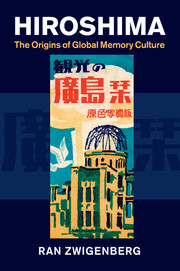
-
Select format
-
- Publisher:
- Cambridge University Press
- Publication date:
- 05 September 2014
- 15 September 2014
- ISBN:
- 9781107775442
- 9781107071278
- 9781107416598
- Dimensions:
- (228 x 152 mm)
- Weight & Pages:
- 0.67kg, 348 Pages
- Dimensions:
- (229 x 152 mm)
- Weight & Pages:
- 0.51kg, 348 Pages
- Subjects:
- East Asian History, Area Studies, Asian Studies, History
You may already have access via personal or institutional login- Subjects:
- East Asian History, Area Studies, Asian Studies, History
Book description
In 1962, a Hiroshima peace delegation and an Auschwitz survivor's organization exchanged relics and testimonies, including the bones and ashes of Auschwitz victims. This symbolic encounter, in which the dead were literally conscripted in the service of the politics of the living, serves as a cornerstone of this volume, capturing how memory was utilized to rebuild and redefine a shattered world. This is a powerful study of the contentious history of remembrance and the commemoration of the atomic bomb in Hiroshima in the context of the global development of Holocaust and World War II memory. Emphasizing the importance of nuclear issues in the 1950s and 1960s, Zwigenberg traces the rise of global commemoration culture through the reconstruction of Hiroshima as a 'City of Bright Peace', memorials and museums, global tourism, developments in psychiatry, and the emergence of the figure of the survivor-witness and its consequences for global memory practices.
Awards
Winner, 2016 John Whitney Hall Book Prize, Association for Asian Studies
Reviews
‘This brilliant book reminds us of how Hiroshima and Auschwitz were first paired in the Cold War emotional imaginary and explicates beautifully the tensions between messages of peace and commodification of atrocity, and between instrumentalization and sanctification of survivors.’
Dagmar Herzog - City University of New York
‘Through his rich and thought-provoking study of commemoration at Hiroshima, Ran Zwigenberg opens up the novel topic of how World War II was remembered in different ways the world over. Full of both comparative and transnational insights, this book is not only insightful about Japanese history but also intimates a promising set of inquiries into global memory culture.’
Samuel Moyn - Harvard University, Massachusetts
‘In a major contribution to memory studies, Zwigenberg controversially links Hiroshima and the Holocaust through the figure of the 'victim-hero' in the stories we tell of both of them. His conclusions are unsettling but necessary.’
John Whittier Treat - Yale University, Connecticut
'Zwigenberg charts the course of how the citizens of Hiroshima, and the Japanese in general, transformed the city from a site that longed for peace in the postwar period to a place of remembrance of war horrors in more recent decades … recommended.'
Source: Choice
'An exceptional combination of meticulous and multi-level archival research with a strong critical voice.'
Source: Reviews in History
'This is an exciting topic, treated here with an impressive, unprecedented range and depth of research, as its purview extends from Hiroshima to Israel. The author's archival excavations include local newspapers carrying articles on the atomic bombing and personal interviews. He takes up topics from architecture to psychiatry in examining the sociocultural transformation in the construction of memory from 1945 to 1995. As all this should suggest, the book's main value is in its descriptive richness, the abundance and diversity of the information it presents.'
Yuki Miyamoto Source: The Journal of Japanese Studies
Contents
Metrics
Altmetric attention score
Full text views
Full text views help Loading metrics...
Loading metrics...
* Views captured on Cambridge Core between #date#. This data will be updated every 24 hours.
Usage data cannot currently be displayed.
Accessibility standard: Unknown
Why this information is here
This section outlines the accessibility features of this content - including support for screen readers, full keyboard navigation and high-contrast display options. This may not be relevant for you.
Accessibility Information
Accessibility compliance for the PDF of this book is currently unknown and may be updated in the future.


